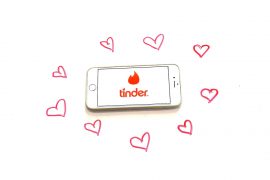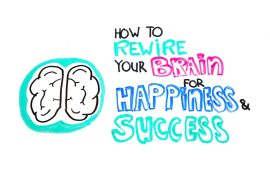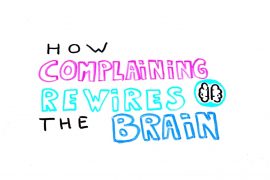Are you having trouble making decisions in your daily life? Do you avoid making a decision because you are afraid you will regret it later? Are you unable to choose without asking for other people’s advice? Then this is for you.
When it comes down to decision-making, there are two types of people according to Barry Schwartz, professor of Psychology and Economy.
Satisficers And Maximizers: Which One Are You?
Satisficers are people who make a decision when they found something that meets their requirements.
Maximizers are the ones who only want to make optimal decisions. They will not decide before they have seen ALL options, even if they already came across options that met their criteria.
Which one of these are you? Although many people are a combination of both, some are clearly more one than the other. If you recognize yourself as a maximizer you might experience difficulty with decision-making. If you are a maximizer you tend to obsess over decisions, even small daily decisions that don’t have a great impact on your life. You feel most comfortable when you have the time to research all your options. Sounds relatable?
But, aren’t maximizers the BEST decision-makers because of their thorough approach? Why do they even have trouble with it? Well, the problem is the following. Because maximizers weigh every option (even after the decision has been made) they never really experience the psychological benefit of making decisions. They experience feelings of joy and contentment LESS because they keep looking back. This means that maximizers are NOT being positively reinforced to make a decision the next time.
How Cognitive Dissonance Influences Our Behavior
Why does this happen? This is where the cognitive dissonance theory comes into play.
When you make a decision you will experience cognitive dissonance. Cognitive dissonance is the mental discomfort we experience when we simultaneously hold two or more contradictory beliefs. With regards to decision-making, this is termed decisional dissonance or post-decision regret. This is what we experience when we decide to go for one option, and therefore give up other attractive options. It leaves us thinking: ‘What if the other options will later turn out to be the better choice?’
According to the cognitive dissonance theory people feel a strong urge to REDUCE this dissonance. Our brains do this by simply rationalizing away irrational thoughts and behaviors. For instance, did you ever drink or eat something not in line with your diet plan and told yourself: ‘oh well, it’s fine because it’s Saturday night and I deserve it’? That’s our mind rationalizing away counteracting intentions and behavior. When we make a decision that is not fully in line with our intentions, our mind will make sure to match our intentions with our behavior. Our mind will work hard to make us feel GOOD about the choice we made. You have probably noticed that once you decided to move into that new apartment, go on holiday to Italy instead of Spain or choose pizza over fries, you start to mostly see the positive sides to your choice. This is also termed the choice-supportive bias. By making a decision we are positively rewarded with a us feeling satisfied.
Maximizers, however, tend to leave room for doubt because they do NOT actively decrease their cognitive dissonance. For instance, when you leave the tag on a newly bought shirt and therefore maintain the option to return it later. Experiencing cognitive dissonance AFTER having made a decision, leads to feelings of stress or discomfort instead of reward. You can now probably imagine WHY maximizers don’t like to make decisions.
The only way to BEAT this fear of decision-making is by experiencing the positive cognitive reward. How do you achieve that? Here are a few tips!
How To Make Decision-Making Easier
First of all, let’s look at the type of decision-making. Should you be rational or is it wise to follow your intuition?
- For simple decisions be rational. When making low-impact decisions (‘Where shall we have lunch?’) base your choice on a quick rational analysis like weighing pros and cons.
- For very complex or high-impact decisions trust your gut. When making high-impact life decisions (“Do I go for this new job?”) it’s best to combine rational decision-making with listening to your gut instinct. Your gut instinct, or your intuition, is your brain picking up on patterns that you consciously did not notice yet. In situations where many factors influence your decision your brain might recognize a pattern that you would not notice looking at facts only.
Read more on this topic in
Logic Versus Intuition In Decision Making: When Can You Trust Your Gut Feeling?
Practical Tips To Help Improve Your Decision-Making Skills
Decision-making is a skill. This means that you can LEARN to make better decisions and PRACTICE this skill.
1. Start small
The best way to experience positive cognitive rewards is to make MORE decisions with which you feel satisfied. So the best strategy is to start small. Start by making quick decision in daily life situations, with confidence. Be the one to decide on the restaurant, stop checking every cucumber in the supermarket and order the drink that first comes to your mind.
2. Make your good decisions visible
Make a list of decisions you are happy with that you made in the past. Seeing a great track records will help you to BOOST your confidence in decision-making.
3. Know that you will always have another chance to make new choice
Bad decisions do not exist. Why? When you make a decision, it’s the best decision for you at that moment in time with the information you had then. Period. It can always happen that at a later point in time you learn that you could have better chosen otherwise. That realization will lead to you having another choice: changing your situation OR not changing anything. This is a second chance to make the best choice for you.
4. Stop listening to (and asking for!) other people’s opinion
When you have a hard time making decisions the chances are that you like hearing other people’s advice. Are ‘What would you do?’ and ‘Do you think this is right for me?’ sentences you often say? Well. Stop that.
First of all, hearing other people’s opinions will make it harder for you to choose. When you value their opinion you now need to make ANOTHER decision, being: do I agree with their opinion or not? It will also refrain yourself from listening to your own inner voice AND from practicing to make your own decision. Plus, when you eventually make the decision it can happen that you feel more like it was a ‘group’ decision, making the positive reward in your brain to become smaller.
Liked this? Check me out on YouTube!
How To Increase Grit: The Number One Personality Trait To Predict Success






